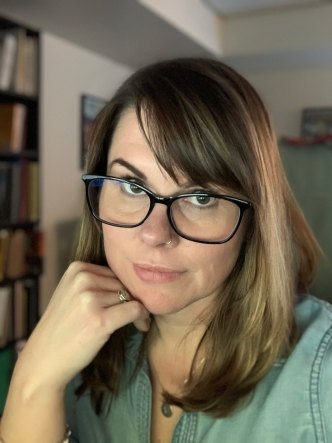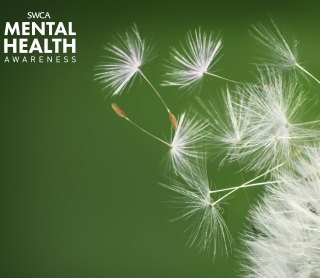We sat down with Annie Lutes, Lead Architectural Historian and Co-Lead of SWCA’s Mental Health Matters ERG to talk about how mental health comes into play at work and being an empathetic listener.
Hi, Annie! Thanks for joining us for a conversation about mental health. Would you like to get started by telling us about yourself and your career?
 Annie Lutes, Lead Architectural Historian and Co-Lead of the Mental Health Matters ERG at SWCA.
Annie Lutes, Lead Architectural Historian and Co-Lead of the Mental Health Matters ERG at SWCA.A: I was born and raised in Michigan, and I moved to Tucson, Arizona. I decided to pursue my first graduate degree from the University of Arizona. Then, I took a big leap and moved to Jerome, Arizona where I worked as the town zoning administrator, historic preservation officer, and planning director. Needing a change, I applied to Northern Arizona University where I pursued a second graduate degree in Geography while I worked at the Coconino National Forest as an archaeologist.
I began working at SWCA’s Flagstaff, Arizona office as an environmental planner and archaeologist in 2013. I have been here over 11 years, and it feels like I have essentially grown up with SWCA.
Q: What are some of your favorite things to do outside of work?
A: One of my biggest accomplishments is obtaining certification as an end-of-life doula, also called a death doula. While I have not been able to volunteer as much as I would like recently, it is an honor to support those who are dying and serve their non-medical needs. Many people are not yet familiar with death doulas or end-of-life care as a specialty, but I have noticed that people are starting to seek the holistic support of death doulas more frequently. It means a lot to me to help people in this way.
Q: How did you start leading the Mental Health Matters ERG?
A: I have been an ERG member from the start! I joined the group because I have had some incredibly low points in my life related to my mental health, and I wanted to make it a priority to support others. I was diagnosed with bipolar disorder at 34 about 1.5 years into my job here at SWCA. With my diagnosis, things finally started to make sense. A few members of the ERG were the first people that I disclosed my disorder to, and it was really liberating. I quickly made connections in the company who also have bipolar disorder and it was amazing to find out I was not alone. I am now a 44-year-old child-free single cat lady who has embraced what I call “unrefined spinsterhood,” where I am beginning to foster a deep appreciation for who I am now, despite not fitting into social norms as a woman entering middle age. There are others in the company who can relate to the mental health challenges I juggle, and I find solace in our ERG in so many ways.
The MHM ERG is for everyone, no matter what diagnosis you do or do not have. I stepped into the co-lead role when the opportunity arose, driven by the desire to support others who may feel they needed to hide their mental health struggles at work. Mental health comes into play whether someone is going through trauma, grieving a loss, receiving a new diagnosis, finding the right balance of medication, and so many other ways. I am grateful I can co-lead the group with Randi and provide support and resources to our group members.
Q: What are some of the goals and activities of the group?
A: Our focus is empowerment because no one is immune to mental health struggles. We also aim to increase general mental health awareness, so that others can recognize when someone is struggling and support that person. We need to normalize talking about mental health challenges and struggles in the workplace. We are person-centered at SWCA already, but our company culture can always continue to improve around mental health because it makes a real difference in people’s lives. Distress is isolating, but we want everyone at SWCA to know that they are never alone no matter the circumstances.
Q: How does being a part of the ERG personally benefit you?
A: Self-care is an act of kindness to yourself, and I am a firm believer that joining an ERG can be part of one’s self-care. It is amazing to be able to take an hour every month to seek support for myself when I need it and provide that safe space for others. There is power in peer support and our ERG embodies that.
Q: As #OneSWCA, how can we be proactive allies to colleagues who are experiencing mental health challenges?
A: One of the most important ways that anyone can be a proactive ally is to become an empathetic listener. Also called non-judgmental listening, it is a technique taught in mental health first aid, but there are many sources online that are readily available. Primarily, we need to understand that empathetic listening frees us from the feeling of needing to “fix” the situation for someone else. Also, you do not need to be able to relate directly to what someone is going through to be an empathetic listener. We often try to relate to others by giving an example from our own lives, but this puts focus on us and takes it away from the person who needs support. Try to refrain from “I” statements when stepping into the ally role and aim to listen without judgment. Instead of saying “I know how you feel because I went through the same thing when I…” use your experience and empathy to say, “I hear you, that must be/feel very frustrating/hard/challenging…” and so forth. Recognize the uniqueness in the other person and know you may not actually feel the same way they do even if you think you do.
Focus on your language and actions. Learn about mental health microaggressions and work on erasing them from your vocabulary. Statements like “I color-coded those meeting notes, I’m so OCD,” or “This client is crazy with that project schedule! Are they manic or something!?” or even “Everyone gets overwhelmed facing a deadline, you just learn to deal with it” are hurtful and invalidating. Avoid words that associate a mental illness with something it is not. We should work to be more mindful of each other and the words we use and how we interact with one another as we do not know what others may be going through or struggling with in that moment.
We need to recognize the unique intersectionality between mental health and the layers of one’s identity. We face different issues relative to various aspects of our lives away from work, like being a parent or caregiver, or even our relationship status (e.g., married/partnership/single). We also need to keep in mind that mental health issues manifest differently within underrecognized communities, and we need to understand our privilege and how it comes into play compared to our BIPOC and LGBTQIA+ peers.
Finally, shatter your stigma! There have been instances where employees are dealing with mental health challenges, and it has been misinterpreted as a measure of one’s ability to accomplish a job task or as a measure of performance when working with a team. We need to step outside of our comfort zones as project and people managers to better understand each other to know if someone is experiencing a mental health challenge and may need support. Be kind and stay curious!
